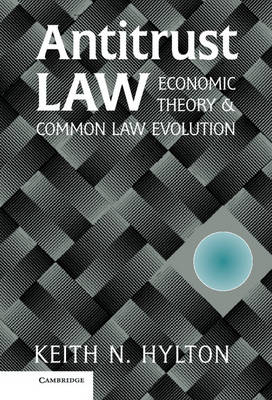
Antitrust Law
Cambridge University Press (Verlag)
978-0-521-79031-4 (ISBN)
This book is an effort to consolidate several different perspectives on antitrust law. First, Professor Hylton presents a detailed description of the law as it has developed through numerous judicial opinions. Second, the author presents detailed economic critiques of the judicial opinions, drawing heavily on the literature in law and economics journals. Third, Professor Hylton integrates a jurisprudential perspective into the analysis that looks at antitrust as a vibrant field of common law. This last perspective leads the author to address issues of certainty, stability, and predictability in antitrust law, and to examine the pressures shaping its evolution. The combination of these three perspectives offers something new to every student of antitrust law. Specific topics covered include perfect competition versus monopoly, enforcement, cartels, section 1 doctrine, rule of reason, agreement, boycott, power, vertical restraints, tying and exclusive dealing, horizontal mergers, and conglomerates.
Keith N. Hylton has taught at the School of Law of Boston University since 1995. He previously served on the faculty and was tenured at Northwestern University School of Law. Professor Hylton currently teaches courses in antitrust, torts, and labor law, and writes widely in the field of law and economics, with more than forty publications in American law journals and peer-reviewed law and economics journals. He has served as a Director of the American Law and Economics Association.
Part I. Economics: 1. Definitions; 2. Perfect competition versus monopoly; 3. Further topics; Part II. Law and Policy: 4. Some interpretations issues; 5. Enacting the antitrust law; 6. What should antitrust law aim to do?; Part III. Enforcement: 7. Optimal enforcement theory; 8. Enforcement provision of the antitrust laws; Appendix; Part IV. Cartels: 9. Cartels; 10. Conscious parallelism; 11. Conclusion; Part V. Development of Section 1 Doctrine: 12. The Sherman act versus the common law; 13. Rule of reason and per se rule; 14. Conclusion; Part VI. Rule of Reason and Per Se Rule: 14. The case for price-fixing; 15. Per se and rule of reason analysis: further developments; 16. Per se versus rule of reason tests: understanding the Supreme Court's justification for the per se rule; Part VII. Agreement: 17. The development of inference doctrine; 18. Rejection of unilateral contract theory; Part VIII. Facilitating Mechanisms: 19. Data dissemination cases; 20. Basing point pricing and related practices; 21. Basing point pricing: economics; Part IV. Boycotts: 22. Pre-Socony; 23. Post-Socony; 24. Post-BMI/Sylvania; 25. Conclusion; Part X. Monopolization: 26. Development of section 2 doctrine; 27. Leveraging and essential facility cases; 28. Predatory pricing; 29. Conclusion; Part XI. Power: 30. Measuring market power; 31. Determinants of market power; 32. Substitutability and the relevant market: cellophane; 33. Multi-market monopoly and the relevant market: Alcoa; 34. Measuring power: guidelines; Part XII. Attempts: 35. The Swift formula and modern doctrine; 36. Dangerous probability requirement; Part XIII. Vertical Restraints: 37. Resale price maintenance; 38. Vertical non-price restraints; 39. Manufacturer retains title; 40. Agreement; Part XIV. Tying and Exclusive Dealing: 41. Introduction; 42. Early cases; 43. Development of the per se rule; 44. Tension between rule of reason arguments and per se rule; 45. Technological tying; 46. Exclusive dealing; Appendix; 47. Horizontal Mergers: 48. Reasons for merging and implications for law; 49. Horizontal merger law; 50. Conclusion; Appendix; Part XV. Mergers, Vertical and Conglomerate: 51. Vertical mergers; 52. Conglomerate mergers; 53. Concluding remarks; Part XVI. Antitrust and the state: 54. Noerr-Pennington doctrine; 55. Parker doctrine.
| Erscheint lt. Verlag | 27.3.2003 |
|---|---|
| Zusatzinfo | 14 Line drawings, unspecified |
| Verlagsort | Cambridge |
| Sprache | englisch |
| Maße | 152 x 229 mm |
| Gewicht | 800 g |
| Themenwelt | Recht / Steuern ► EU / Internationales Recht |
| Recht / Steuern ► Wirtschaftsrecht ► Gesellschaftsrecht | |
| Sozialwissenschaften ► Politik / Verwaltung ► Politische Theorie | |
| ISBN-10 | 0-521-79031-X / 052179031X |
| ISBN-13 | 978-0-521-79031-4 / 9780521790314 |
| Zustand | Neuware |
| Haben Sie eine Frage zum Produkt? |
aus dem Bereich


